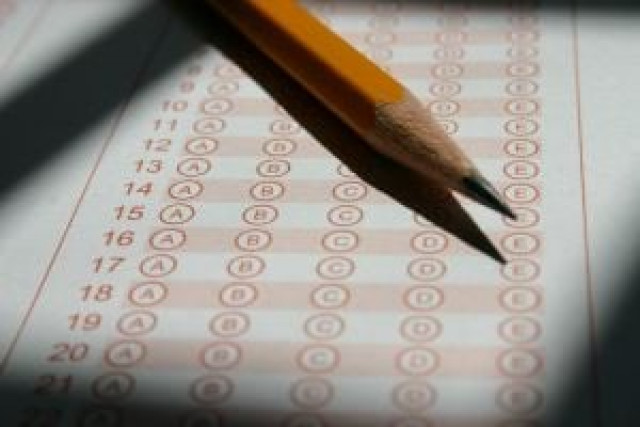Pens down: Over 250,000 students take seminary board examinations
Official claims Shahadul Alamia equivalent to a Masters degree.

Official claims Shahadul Alamia equivalent to a Masters degree. PHOTO: FILE
The annual exams of Wifaqul Madaris, an education board for religious seminaries belonging to the Deobandi sect of Sunni Muslims, which began on May 24, concluded on Thursday. The checking of papers will begin on June 2.
According to Wifaqul Madaris Multan official Rashid Mukhtar, 251,800 students appeared in the exams. Out of these, 128,522 were male students and 123,278 were females. A total of 1,580 examination centres were set up in madrassas across the country, said Mukhtar.
“The exams were held for Class 2, 4, 6 and 8, which is the final year of study. Upon passing Class 8, the student is awarded a degree called Shahadul Alamia, which is equivalent to the Masters degree of the local education system,” Mukhtar explained.
The official further said the basic qualification for securing enrolment in Wifaqul Madaris schools is the Secondary School Certificate from any education board in Pakistan.
The syllabus set by Wifaqul Madaris includes Islamic Fiqa (jurisprudence), logic, Arabic grammar, Hadith, Quran study, Persian, Mathematics, English grammar, Astronomy and Islamic history among others.
The board has offices in all major cities of Pakistan where aside from the annual exams board members also take exams of Hafiz-e-Quran.
“Free of corruption”
Mukhtar said the fee structure for the Wifaqul Madaris examination is reasonable, starting from Rs200 for Class 2 and Rs400 for Class 8 to sit in the annual exams.
Furthermore, those who invigilate the exams do not even receive travel or daily allowances like invigilators of other boards. For the duration of the entire examination, the invigilators only get paid Rs2,000. Mukhtar added there was no room for cheating or corruption in the marking of the papers as the majority of examination staffers are volunteers.
“After the answer sheets are collected from across the country, they are marked through a centralised system in Multan where several four-member teams are allotted one question each to mark. The team checks them and forwards them to another team of head examiners who recheck the papers and recount the marks,” said Mukhtar.
He explained that by this system the margin of error in marking is reduced considerably and gives equal opportunity for all madressa students to achieve high marks. Muhammad Arif, an invigilator who was supervising the religious exam at a centre in Shabqadar, Charsadda told The Express Tribune that cheating does not occur during the papers. “The students are advised at the centre that cheating is haram (un-Islamic).”
In pursuit of religious education
Fifty-year-old Gul Badshah who sat for his Class 2 exam said he had passed his graduation and was a government employee. “I know that attaining Islamic education is my prime responsibility which is why I enrolled in a madrassa. The examination system is far better than the other education boards because there is no space for cheating as is common in regular exams,” he said. He added the students were sitting on the ground to solve their papers, there was no electricity or cold water, yet they remained calm and did not protest.
Wifaqul Madaris is one of the five education boards for seminaries in the country. It was founded in October 1959 in Multan, Punjab. Wifaqul Madaris currently has 17,187 madrassas across the country and employs 107,908 teachers, while student enrolment stands at 2,199,863.
Published in The Express Tribune, May 30th, 2014.













COMMENTS
Comments are moderated and generally will be posted if they are on-topic and not abusive.
For more information, please see our Comments FAQ